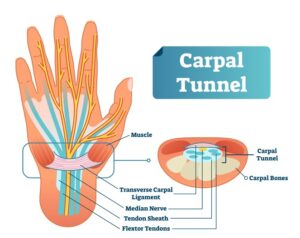Our bodies are wonderful examples of superb electrical engineering, but problems like carpal tunnel syndrome can cause pain.
When you press a button on your phone or type words on your keyboard, electrical signals travel from your fingertips, down the median nerve through your wrist, up your arm to your spinal cord and then to your brain and back again in the blink of an eye.
When we are active for long periods of time, our physical body may get tired. If this happens with our hands and wrists, a condition called carpal tunnel syndrome may develop.

“The carpal tunnel is the space in between the wrist bones and the ligament that forms the roof of our wrist,” said Dr. Peter Loo, sports medicine physician at The University of Kansas Health System St. Francis Campus.
“Going through this tunnel are 9 tendons and the median nerve, which is the main nerve in our hand. When our hands are very active, the tendons and the nerve are constantly in motion and may rub against each other. Too much friction and the nerve starts to send out pain signals,” said Dr. Loo.
What are the symptoms of carpal tunnel syndrome?
The most common symptoms are numbness and/or pain in first 3 fingers (thumb, pointer, middle) and sometimes the ring finger. Your hand may also have some general weakness.
Mild, occasional symptoms are mostly an annoyance and should be treated with anti-inflammatory medications. Mild cases may also warrant occupational therapy or wearing a brace to minimize the movement of the wrist. If the condition advances to moderate pain, more anti-inflammatory pills or an injection may be prescribed. Severe pain may mean that surgery is necessary, but only 15-20% of all cases require surgery.
If your symptoms are more than annoyance and you have daily symptoms that interfere with your activities, Dr. Loo recommends that you see your doctor.
Who is most at risk for developing carpal tunnel syndrome?
Studies have shown that older people and women (more than men) are more likely to develop this condition. Genetics are an important factor, as the size of one’s wrist or the amount of space available for the nerve and tendons may be smaller in some families and passed down to future generations.
People with occupations and hobbies that involve repetitive hand use or prolonged periods with the hand and wrist in a certain position (typists, musicians, factory workers, etc.) are at higher risk. These activities may aggravate the condition.
Pregnant women may be more at risk, as swelling during pregnancy can restrict the size of the carpal tunnel. Conditions such as diabetes, rheumatoid arthritis or thyroid gland imbalance are often associated with carpal tunnel syndrome.
How likely will surgery be needed?
Conservative, non-surgical treatments will be applied first to your condition. Fortunately, most mild and moderate cases respond well to nonsurgical management.
However, if your severe condition falls within the 15-20% of all cases with the following signs, surgery may be necessary:
- You have had carpal tunnel syndrome for 6 months or more
- You are 50 years or older
- Positive findings on physical exam in less than 30 seconds of testing
- Impaired 2 point discrimination (> 6mm)
- More severe findings on nerve study tests
Dr. Loo and the Orthopedics and Sports Medicine team at St. Francis Campus specialize in the prevention and management of all types of injuries affecting the bones, muscles, ligaments, tendons and nerves. To learn more about our services, visit our Orthopedics Department web page or call one of our offices:
Tallgrass – (785) 233-7491
Brewster – (785) 379-4600

